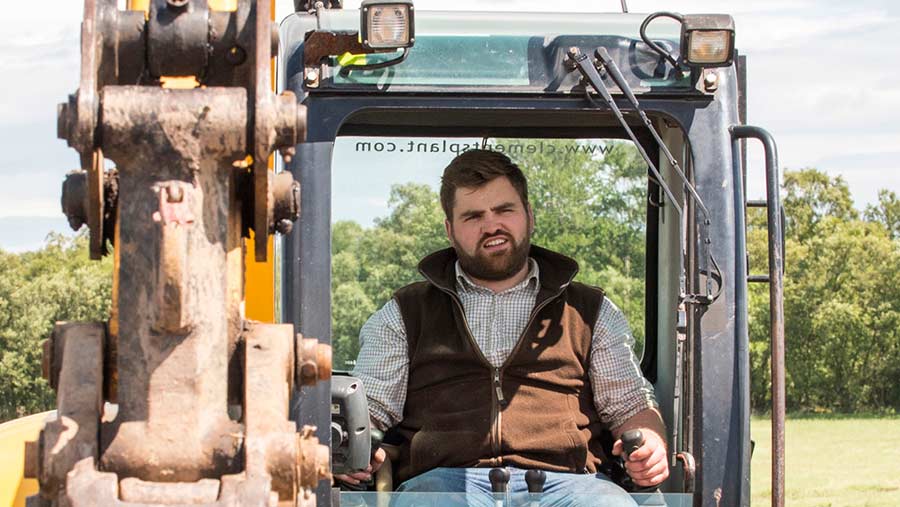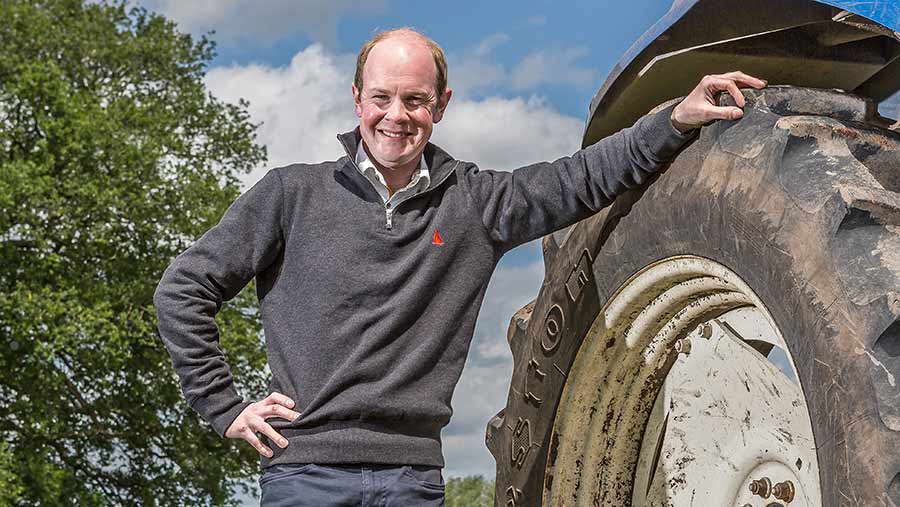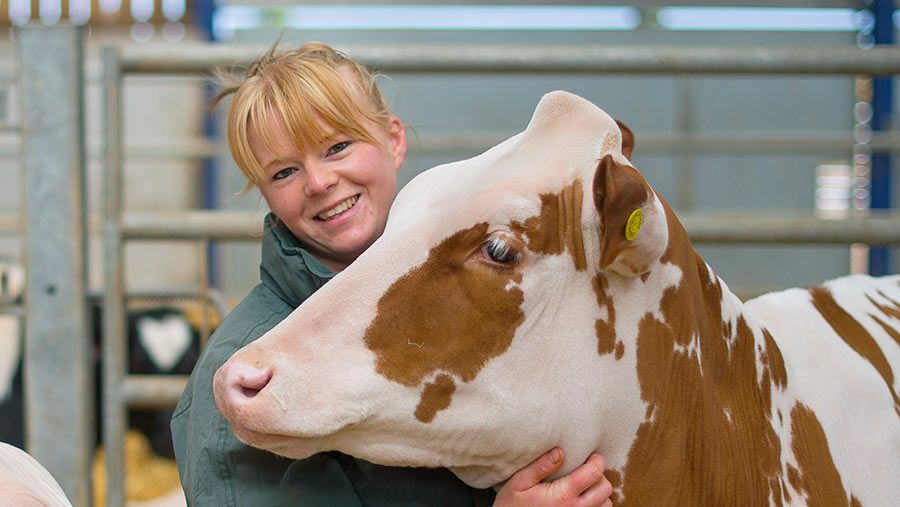2017 FW Awards: Young Farmer of the Year finalists
The Farmers Weekly Awards 2017 finalists have been announced and the judges have visited each of the finalists for a three-hour interview and tour.
Johann Tasker reports on the Young Farmer of the Year finalists, who have taken their first steps on the farming ladder and are well on the way to building successful and thriving businesses.
See also: Book your table for the 2017 Farmers Weekly Awards night
- James Fairlie, Kirkton of Monikie, Broughty Ferry, Dundee
- Robert Greenow, Crescent Farm, Waters Upton, Shropshire
- Molly Westwood, Molland Ridge Farm, Chulmleigh, Devon
The judges:
- Debbie Beaton, independent judge
- Johann Tasker, Farmers Weekly
- David Cooper, 2016 Farmers Weely Awards Young Farmer of the Year
James Fairlie, Kirkton of Monikie, Broughty Ferry, Dundee

James Fairlie © Angus Findlay
Starting out
Farm facts
- 890ha arable crops plus 500kW anaerobic digester
- Crops include potatoes for major supermarkets, malting barley and oats
- Digestate saves an estimated £27,000 in annual fertiliser application costs
James worked in Australia after graduation before returning to the family farm. Investing heavily in technology, he has expanded the business to include an anaerobic digester and contract farms a neighbouring 570ha.
“My father Ian and his brother David used to farm together as a partnership until August 2013,” he explains.
“They decided to split the business to help the younger generation of the family take it in the direction they wanted to go.”
James says his objective has always been to be the biggest and the best at what he does – not necessarily by increasing the area farmed, but by increasing the size of the business so it can benefit from synergies and economies of scale.
Realising an anaerobic digester would fit well with the existing arable enterprises, he obtained planning permission and the plant was finally commissioned last August. It produces 500kW of electricity which is exported to the national grid.
Challenges
Local land prices of up to £20,000/acre mean limited opportunities for expansion.
“Competing with big farms for land is challenging,” says James. “I also did not see the point in spending all that money on land when average returns wouldn’t even pay the interest.”
Anaerobic digestion has proved to be a lucrative way of increasing returns without expanding the farm.
But James says with hindsight he should have let someone else manage the project rather than trying to do it all himself.
“During the winter months, it wasn’t so hard – but once it started becoming springtime and I was tied up on machinery for sowing and planting potatoes it became extremely hard and took its toll on my stress levels.”
Future
The future, though, is promising. While the AD plant was being commissioned, James was approached by a neighbouring farmer who asked him if he would be interested in contract farming some 570ha of nearby land.
“I felt great pride,” says James. “Opportunities like this are one in a million in our area. It was as if our hard work and dedication to doing as good a job as we can was being noticed and appreciated – we accepted straight away.”
More crops are sold forward and, to further optimise returns, the business has invested heavily in GPS and auto shut-off.
“All in all, I feel I am the right path to creating a healthy business which at one point was struggling due to poor commodity prices.”
The judges liked
- Exploiting the synergies of bioenergy with farming
- Managed a successful and equitable transition of the farm to the next generation
- Using precision techniques to improve farm productivity and profitability
- Constantly scrutinising costs and evaluating new investments
- Strong community and partnership ethos
Robert Greenow, Crescent Farm, Waters Upton, Staffordshire

Robert Greennow © Richard Stanton
Starting out
Farm facts
- 66ha arable farm, including a livery and separate 249kW anaerobic digester
- Haylage and 5ha of trial crop low-input, high-protein lucerne grown for horses
- 5% of farm in wildlife conservation after securing a mid-tier countryside stewardship grant
A farmer specialising in anaerobic digesters, Robert is also a serial entrepreneur – starting his own free-range egg business as a teen before selling it to fund a degree course in agricultural business management at Reading University.
Between terms at university, Robert worked for agricultural contractor Cadwaladrs. “It taught me a lot about running a profitable business – and I soon understood that you don’t need brand new equipment to start a business or do a good job. You need knowledge and ability.”
A job in the on-farm biogas industry followed after graduation. But Robert was made redundant after a year. “It was the push I needed to start out on my own and I formed BioG UK at the age of 22,” he says. Seven years later, the business has gone from strength to strength.
Challenges
Robert now owns his own 249kW anaerobic digestor, with two larger projects under construction. He has used his experience to support other farmers through his own consultancy business and managed to purchase his own arable farm last year.
“It was a redundant farm and needed a complete overhaul, with some fields being fallow for over two-and-a-half years,” he says. “We started with soil analysis, undertook a huge amount of drainage work and had to implement a mass weed control programme.”
Some land is rented out for potatoes, carrots and grass keep. But much of the arable work remains in-house. The farm produces all the hay and haylage required for an on-farm livery run by Robert’s partner Katie French.
Success is an ongoing project, says Robert. But he has turned the farm around. “It’s my proudest and greatest achievement,” he says. “I’m growing multiple businesses off what is a relatively small area and making a sustainable future for myself in farming.”
Future
Goals include plans to build an eco-friendly, modern farmhouse using state-of-the art installation techniques. “My vision is to create renewable energy through special solar capture windows – and energy from a biomass boiler,” Robert says.
“I’m proud to say I make money out of farming, which many people warned me wasn’t possible. Through hard work, and being prepared to look at new ideas and diversifications, I have three successful businesses under my belt and I feel confident about the farm’s future.”
The judges liked
- Started a free-range egg business to help fund a place at Reading University
- Single-minded business and profit focus
- Secured a £17m investment to build his AD plants
- Squeezing every possible value from his farming land
- Keen to develop carbon neutral operation and add biodiversity to the farm
Molly Westwood, Molland Ridge Farm, Chulmleigh, Devon

Molly Westwood © Jim Wileman
Starting out
Farm facts
- Successfully expanded from eight cattle to a 57-cow herd
- Numerous top prices for freshly calved heifers through Sedgemoor market, Somerset
- Sells embryos and show cattle to the UK, Italy, Germany, Canada, France and Switzerland
Walking the lines of cattle in Molly’s shed is like a who’s who of pedigree Holsteins: every single animal is either a world-class winner – or about to be.
Molly is founder and owner of Panda Holsteins – a Holstein genetic business breeding and producing animals of exceptionally high quality based on their confirmation, genomics, production and longevity.
Returning home after four years working in Canada for the pedigree show herd Morsan Farms, Molly founded Panda Holsteins by purchasing five embryos from a cow she believed capable of breeding exceptional offspring – and implanting them in five non-pedigree heifers.
Today, she sells embryos and show cattle to six different countries. “The genetics side of the cattle has always interested me,” she explains. “Improving the next generation and helping build foundation cow families to improve the profitability of the business is very rewarding.”
Challenges
To expand her business, Molly had to convince lenders it was a viable proposition. She needed to borrow money to construct a larger dual-purpose building that would house both cattle for showing and recipients for calving.
“Our bank had never seen a five-year business plan like mine,” she says.
“Throughout the meetings I had to explain that I was not a typical dairy farmer – and Panda Holsteins income does not rely on fluctuating milk prices.”
Having had several “battles” with the banks, Molly secured her first loan at the age of 23 to start expanding the business. And she says she managed to keep within budget despite the industry being at one of its lowest points.
Future
In five years, Molly aims to have a fully established business, with her first loan on its way to being paid off. Continuing to calve 30 heifers each year, she is marketing, showing and selling cattle while developing the Panda prefix internationally.
Success has come quickly but is built on strong foundations. It is hard work and involves long hours. But Molly says she loves what she does, despite having to get up a 4.30am each morning and not finishing until the last feed at 11pm every night.
“With hard work and dedication, I am on the way to fulfilling my passion and my dream of establishing Panda Holsteins as a leading source of the best Holstein Genetics – not only for the UK but across the globe.”
The judges liked
- Created a profitable global Panda genetics brand from nothing
- 80% sales via a highly effective social media strategy
- Meticulous detail around everything from biosecurity to building design
- More than 80% embryo success (double the national average)
- Investing her time to nurture new talent
Co-op Food is sponsoring 2017 Farmers Weekly Awards Young Farmer of the Year

“The future of agriculture depends on youngsters coming into the industry and The Co-op is tremendously proud to sponsor the Young Farmer category.
“This year’s entries are exceptional and it is an honour to see the passion displayed by these top farmers – all of whom are 30 or under.”
Ciara Gorst, head of agriculture, Co-op Food
